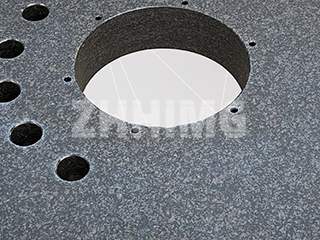Granite mechanical components, such as granite surface plates, are essential for high-precision measurements in industrial settings. These components offer superior stability, resistance to wear, and minimal deformation under varying conditions, making them the ideal choice for precision work. To maintain the accuracy of these tools, proper handling and measurement techniques are crucial. Below is a guide to the key advantages of granite mechanical components and best practices for measurement.
Advantages of Granite Mechanical Components
Granite offers several significant benefits over traditional materials such as cast iron or steel when used in mechanical components:
-
High Stability and Durability: Granite is known for its exceptional stability under various conditions. It is resistant to temperature fluctuations, corrosion, and wear, ensuring that the mechanical components maintain their accuracy over long periods of use.
-
Precision and Accuracy: The uniform structure of granite, with its tightly interlocked mineral grains, ensures that it remains stable and precise, even under heavy loads. This makes granite an ideal material for use in measuring instruments and mechanical components that require high accuracy.
-
Non-Magnetic Properties: Granite is non-magnetic, unlike metals such as steel and iron. This makes it an excellent choice for environments where magnetic interference must be avoided, such as in precision measurement and electronics manufacturing.
-
Minimal Thermal Expansion: Granite has a low coefficient of thermal expansion, meaning it is less susceptible to dimensional changes caused by temperature fluctuations. This property ensures that granite components remain accurate even in environments with varying temperatures.
-
Long-lasting and Maintenance-Free: Granite’s inherent durability means it can withstand years of use with minimal maintenance. Unlike metal components, granite will not rust or corrode, making it a reliable choice for industries that require consistent performance over time.
Measurement Methods for Granite Mechanical Components
To ensure the highest accuracy when using granite measurement tools, it’s essential to follow specific measurement procedures. The following tips will help you achieve the most precise results:
-
Temperature Control
Measurement results can be significantly affected by temperature. To ensure accuracy, both the workpiece and the measuring tool should be at a stable temperature of around 20°C (room temperature). If the workpiece and measuring tool are at different temperatures, thermal expansion or contraction could cause measurement errors, particularly with metal materials. -
Surface Cleaning
Before measuring, ensure that the measurement surface of the granite tool and the workpiece are thoroughly cleaned. Any dirt, dust, or debris on the surfaces can introduce measurement inaccuracies. Using precision tools such as vernier calipers, micrometers, and dial indicators for measurement can help ensure precise results. Avoid using abrasive surfaces or tools with grinding agents, as this could quickly damage the measuring surfaces and lead to loss of accuracy. -
Proper Handling and Storage
Granite measurement tools should never be stored with other objects, such as files, hammers, or cutting tools. This will prevent accidental damage or contact that could affect the precision of the granite tools. Ensure that measuring instruments, such as calipers, are stored flat in protective cases to prevent bending or deformation that could compromise their accuracy. Avoid placing tools on machines where vibrations could cause them to fall or become damaged. -
Avoiding Improper Use
Granite measurement tools should only be used for their intended purpose. Never use a micrometer as a hammer, calipers for marking lines, or steel rulers for unscrewing bolts. Misusing precision tools can cause permanent damage and loss of measurement accuracy. Handle all measuring tools with care and avoid using them for any tasks other than those they were designed for. -
Regular Maintenance and Calibration
Even though granite tools are highly durable, periodic checks and recalibration are necessary to maintain their accuracy. Regularly inspect the tools for any surface wear or damage and perform necessary maintenance to ensure they continue to provide reliable measurements.
Conclusion: The Best Choice for Precision
Granite mechanical components are indispensable for industries requiring high-precision measurements, such as machining, manufacturing, and laboratory testing. With their durability, minimal thermal expansion, and exceptional stability, granite tools remain a reliable and long-lasting solution for accurate measurement.
For the best performance, ensure that proper handling, temperature control, and cleaning practices are followed. If you need high-quality granite mechanical components or measurement tools, contact us today. We offer precision-engineered granite tools designed to meet the demands of your most challenging industrial applications.
Post time: Aug-07-2025

